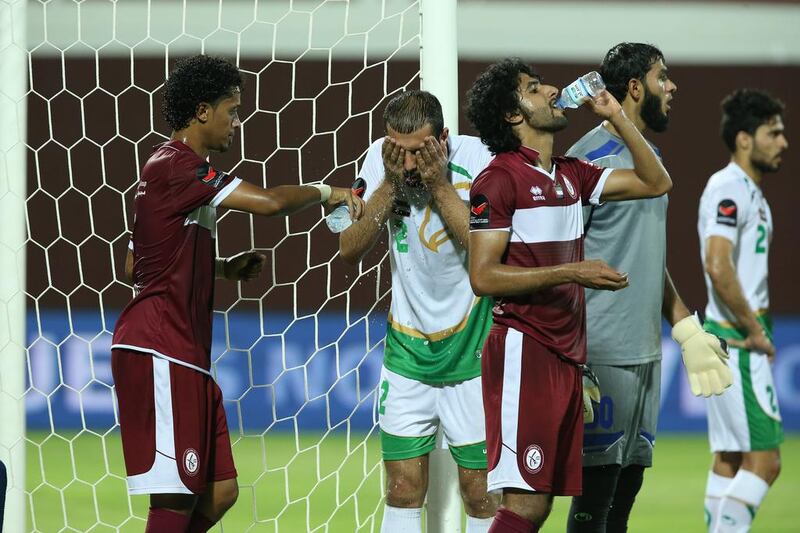Abdullah Faraj, the Al Shabab defender, is a young man who celebrated his 27th birthday last month.
A son of the soil, he started his career at Al Jazira, before moving to Al Dhafra in 2009. So it would be fair to say that the Emirati is not alien to the stifling conditions here.
Yet, last Friday, he left Shabab’s Al Maktoum Stadium in an ambulance, collapsing in the changing room after the 2-0 loss to Al Nasr. The heat and humidity had claimed one more victim.
It was a terribly hot and humid night, and just sitting in the stands, with the luxury of a regular flow of cold drinking water, was a challenge.
Yes, it was that bad for us in the press corps. Save a thought for the players then.
The Al Nasr goalkeeper Yousuf Abdullah could have suffered the same fate as Faraj.
Thankfully he was substituted in the closing minutes, but not before receiving a yellow card as he lay sprawled on the ground.
The referee deemed it was one of those oft-repeated time wasting tactics, but perhaps it was not.
Some compassion please, gentlemen.
On September 20, during an Arabian Gulf League match between Al Ahli v Al Wahda, referee Hamad Al Hashmi showed empathy with the players by stopping play for a couple of minutes in the first half to allow them to drink water and replenish.
That night was even more oppressive than last Friday and officials at virtually every club have been pleading with the Pro League Committee (PLC) to schedule the start of the football season after the worst of the summer months.
Abdullah Hareb, the Al Wasl chairman, asked the PLC to show “mercy” on the players.
“Just sitting here in the stands, we are feeling short of breath,” he said after his team’s win at Al Jazira on September 21. “Imagine the state of the players. They are pouring sweat like rain.
“It is impossible to play in these conditions; it’s unreasonable. So we demand the league officials have mercy on the players and us, and start the league in October.”
Sami Al Qamzi, the chairman of Al Shabab, supported those calls. Worried about the health of the players, he suggested referees show “flexibility” and allow players enough drinks breaks to take on fluids, like Al Hashmi did in the Ahli-Wahda match.
Nasser Al Taliyani, an Al Shaab board member, said his club had racked up bills of more than half a million dirhams on players suffering injuries due to a “lack of oxygen and high humidity”.
Australian midfielder Billy Celeski and Julius Wobay of Sierra Leone had to be sent overseas to Serbia and Qatar for treatment.
Foreign players, as you might expect, have struggled a lot more, particularly those who are playing in the UAE for the first time.
Football has suffered. The fans have suffered. League officials will point to the Under 17 World Cup, which kicks off here on October 17, and the national team’s qualifying campaign for the 2015 Asian Cup as reasons for starting the domestic season early.
Of course, the interests of the national team are paramount and Mahdi Ali does need time to prepare his players before a match as some of them are not playing regularly for their clubs.
But do we really need to stop of the league for 20 days because of that?
Perhaps, it is time to consider playing league matches while the UAE internationals are away.
It would give an opportunity for the fringe players to boost their confidence and aid their development.
More players could be staking their claims then, and that could only be a good thing for UAE football.
And more importantly, we can start the season in better climes. But will the PLC agree?
Your guess is as good as mine.
arizvi@thenational.ae





